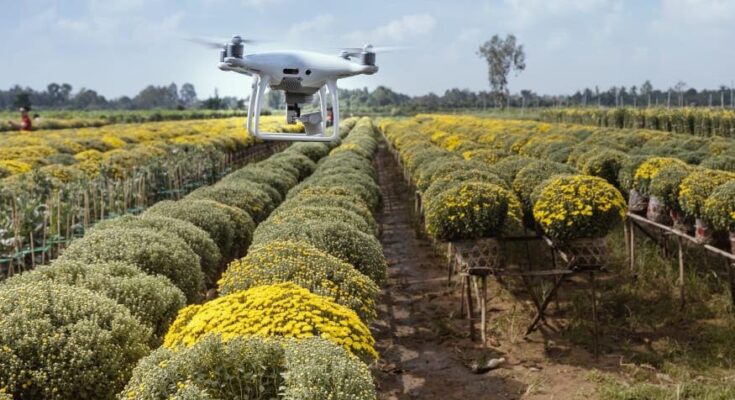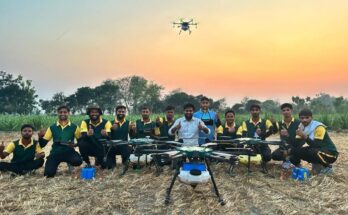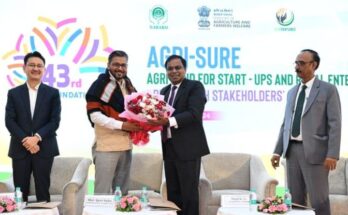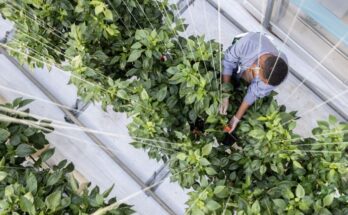In order to fulfil the rising food demand, great emphasis is being given to efficient farming through automation in the field and need-based resource management in farm operations to improve the crop productivity. Though the scientific advances help us in understanding the crop, soil, weather and in what conditions it can grow better, some aspects of agriculture can become more efficient by monitoring and predictive analysis for understanding the accurate status of crops, input requirements and possible yield output. Artificial Intelligence (AI) and remote sensing can help us in this area. AI and advanced satellite imagery, along with weather forecast provide a unique dataset that allows prediction of harvest, tracking presence and spread of pests. This improves crop productivity, address food production issues without degrading environment, enhance farm incomes and can help tackle climate change effectively.
At present, there are several challenges that agriculture sector is facing. Increase in production cost, lack of required water for irrigation, higher labour cost, fall in farm remuneration, frequent incidences of droughts and floods due to climate change are some of the major issues. To make it worse, ongoing Covid-19 pandemic has disrupted the food production system and supply chains significantly.
India has seen rapid adoption of technological innovations in agriculture sector in the recent past. Also, internet services are penetrating the rural areas at a fast pace. This sounds encouraging for the propagation of Artificial Intelligence based tools for better farm management. One such example is AI tool being used to regulate water flow intelligently and prevent unrequired dampness in soil and thus rules out possibility of pests that thrive under excessive moisture.
Artificial Intelligence (AI) enables farmers to carry out farming activities with a great precision as they can make informed choices on deciding the right crops and the right process to cultivate for better returns. Higher yields, healthier crops, effective pest control, soil monitoring are some of the major benefits. Artificial Intelligence in agriculture involves sensors, robots and drones to collect different kinds of information and perform tasks such as weeding, irrigation, spraying pesticides and fertilisers without human intervention. The greenhouse emissions are decreased by 20 percent thanks to new ways of farming AI brings in. This is a significant contribution to the efforts being taken to cut carbon emission.
At present, a major obstacle farmers face is lack of timely and accurate data. Remote sensing, which gives valuable insights into various agronomic parameters, and AI facilitate farmers to micromanage standing crops by taking into account the weather conditions and market dynamics. These technological interventions capture green data from multiple sources, analyse it and turn into valuable insights to help stakeholder use less resources, manage farming activities accurately and efficiently.
Adoption of Artificial Intelligence has so far been driven primarily from commercial perspective thus we need to focus on how to benefit the agriculture sector at large scale. NITI Aayog has sought to embrace AI to reduce our dependence on resources-intensive farm practices in order to boost agriculture value chain. There has been substantial rise of AgriTech start-ups in the past few years. Yet, the adoption of AI has remained limited. NITI Aayog has narrowed down on some problem areas such as difficulty in access to data, high cost and low availability of computing infrastructure, lack of collaborative approach and public awareness.
There is no doubt that agriculture is the backbone of India and supports the livelihood of over 50 percent of India’s population. Besides ensuring food security, the demand of healthy, chemical free food from consumers, which is produced in sustainable manner, all require the digital transformation in agriculture sector. What we need to do is to ensure availability of affordable hardware such as sensor and other communication devices, farm machinery, equipment and software. Similarly, agriculture research institutes, universities must extend their support, build expertise and create awareness for the adoption of Artificial Intelligence and remote sensing in agriculture. One such University in Andhra Pradesh, Acharya NG Ranga Agriculture University (ANGRAU) is using drones in the agriculture sector for various agri related activities. The university is now urging farmers to use drone technology to minimise the input cost on agriculture workers apart from effective practices of seed sowing and spraying pesticides. More colleges and universities should follow the suit.
We will have to start with building AI-enabled infrastructure that has region specific as well as crop specific database. It will be followed up by capacity building and training of farmers on digital technologies including AI and remote sensing. These technologies may not be affordable to individual farmers so in such cases intermediaries such as farmer producer organisations (FPOs) or start-ups can address the problem. Using technology for efficient resources usage, we can achieve higher yields.
(Dr Shivendra Bajaj is the Executive Director of Federation of Seed Industry of India and Alliance for Agri Innovation. Views expressed in the article are author’s own.)




